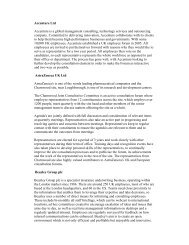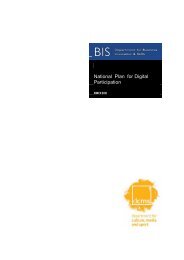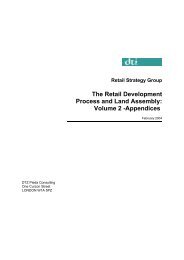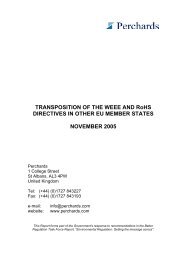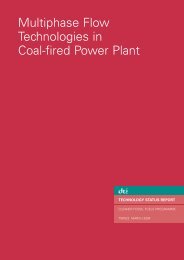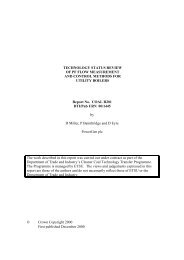Public Policy: Using Market-Based Approaches - Department for ...
Public Policy: Using Market-Based Approaches - Department for ...
Public Policy: Using Market-Based Approaches - Department for ...
Create successful ePaper yourself
Turn your PDF publications into a flip-book with our unique Google optimized e-Paper software.
<strong>Public</strong> <strong>Policy</strong>: <strong>Using</strong> <strong>Market</strong>-<strong>Based</strong> <strong>Approaches</strong><br />
verify that cost data represent the true running costs of the prison, this effect is<br />
unlikely to be very strong. One prison operator observed that requiring cost<br />
disclosure has little effect on incumbency advantages in practice because there<br />
are means of presenting cost in<strong>for</strong>mation in a way that is not helpful to potential<br />
bidders.<br />
HMPS also tries to limit incumbency advantages through multi-sourcing, so that<br />
there are more companies with experience in operating prisons. For example, in<br />
1995 and 1996 a PFI contract was awarded to each of Securicor and GSL, despite<br />
the fact that one bidder had offered a lower price <strong>for</strong> both contracts. This<br />
attracted criticism from the NAO 88 but HMPS defended its decision with<br />
reference to the need to ensure competition <strong>for</strong> future contracts.<br />
An additional way in which competition is encouraged is through a proactive<br />
approach to encouraging firms to bid. There are no examples of potential<br />
suppliers being pre-qualified without previous relevant experience, largely as a<br />
result of strict pre-qualification criteria. However, these criteria do not require<br />
previous experience in running prisons, but only experience in security issues.<br />
For example, Securicor and GSL had no prior prison experience but satisfied<br />
tender requirements by proposing to recruit experienced prison staff from the<br />
UK public sector. Whilst the HMPS procurement group is unable to relax its preselection<br />
requirements, it has nonetheless tried to encourage entry by actively<br />
inviting bidders with experience in custodial services both in the UK and abroad<br />
to submit tenders. The Prison Service is aware of other potential providers who<br />
could be encouraged to submit tenders in the future, and has taken an active<br />
approach to increasing the size of the market by speaking to these firms directly.<br />
As a consequence, two new entrants have submitted bids <strong>for</strong> the management<br />
of a Scottish prison and competition <strong>for</strong> the prison management market in future<br />
tenders is hoped to increase.<br />
The considerable expense involved in the bidding process represents a barrier<br />
to entry, particularly in the case of PFI contracts. 89 One way to encourage bidding<br />
in spite of high costs is to increase the reward <strong>for</strong> winning a tender by offering<br />
more valuable contracts. It can be achieved by aggregating contracts<br />
horizontally, vertically or over time. Contract aggregation refers to the bundling<br />
of service requirements into fewer, larger contracts that are tendered less<br />
frequently. Contracts are aggregated horizontally when identical requirements<br />
are pooled and put out to tender, <strong>for</strong> example, if one contract were offered <strong>for</strong><br />
the management of multiple prison centres. Vertical aggregation refers to the<br />
bundling together of different stages of the value chain, <strong>for</strong> example, sourcing<br />
one supplier to design, construct, manage and finance a new prison under a<br />
DCMF contract.<br />
88 See National Audit Office (1997) The PFI Contracts <strong>for</strong> Bridgend and Fazakerley Prisons, London: The Stationery<br />
Office.<br />
89 See Competition Commission (2002) Group 4 Falck A/S and The Wackenhut Corporation: A report on the merger<br />
situation, available at: http://www.competition-commission.org.uk/rep_pub/reports/2002/471group4.htm, p.21.<br />
90




